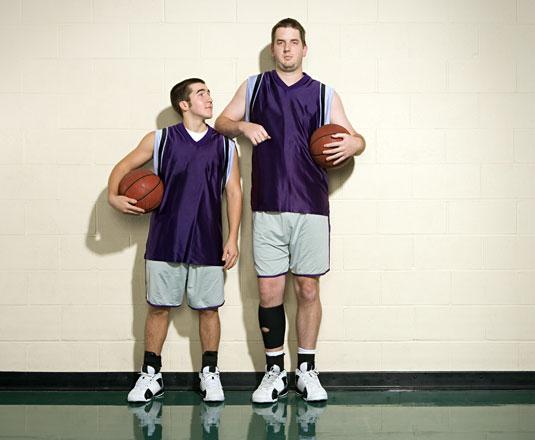You are here
Short kids may have higher stroke risks than their peers as adults
By Thomson Reuters Foundation - Feb 18,2018 - Last updated at Feb 18,2018

Photo courtesy of wordpress.com
Children who are just a few centimetre shorter than their peers are more likely to suffer a stroke in adulthood, a large Danish study suggests.
Adult women who were unusually short girls at age seven years were 11 per cent more likely to have what is known as an ischemic stroke, the most common kind, which occurs when a clot blocks an artery carrying blood to the brain.
Men who were short at age seven were 10 per cent more likely to have an ischemic stroke and 11 per cent more likely to have a haemorrhagic stroke, which happens when a blood vessel in the brain ruptures.
How much kids grew between age 7 and 13 did not appear to influence their future stroke risk, the study also found.
“Our study shows that a short height in childhood signals increased risks of stroke decades later in life,” said senior author Jennifer Lyn Baker of the Centre for Clinical Research and Prevention at Bispebjerg and Frederiksberg Hospital.
“People with shorter heights should work at changing modifiable risk factors that they can control, including high blood pressure, smoking, high cholesterol and obesity, so that their risks of stroke can be reduced,” Baker said by e-mail.
For the study, researchers examined height measurements collected from age seven to 13 for 311,009 school children born between 1930 and 1989.
Researchers followed half of the participants for at least 31 years, with the duration of follow-up ranging from 25 to 83 years.
During the study, 10,412 people had an ischemic stroke and 2,546 had a haemorrhagic stroke.
People who were just two or three inches shorter than average for their age and sex during childhood had an increased stroke risk as adults, researchers report in the journal Stroke.
While previous data from the first half of the 20th century also linked short stature to an increased risk of stroke, this was thought to be due to factors like poor nutrition or childhood infections that might impact height, said lead study author Dr Line Klingen Gjaerde, also of the Centre for Clinical Research and Prevention, Bispebjerg and Frederiksberg Hospital.
“The results of our study challenge this hypothesis,” Gjaerde said by e-mail.
“Despite an increase in average childhood height during our study period in the second half of the 20th century, which was most likely due to improved nutrition and better childhood living circumstances, the risk of stroke in shorter children did not diminish during this period, as we would have expected if these factors were the underlying cause of the increased risks of stroke,” Gjaerde added.
The study was not a controlled experiment designed to prove whether or how short stature might cause increased stroke risk.
Another limitation of the study is that researchers lacked data on how tall the children ultimately grew as adults, the authors note.
Parents of short kids should not necessarily panic and assume a stroke is automatically in their child’s future, but they should take steps to tackle other risk factors for stroke, said Dr Steve Roach, a professor of neurology and paediatrics at the Ohio State University College of Medicine in Columbus.
“While explaining this phenomenon may help us to better understand why some adults experience strokes, height cannot be used to predict whether a given child will have a stroke as an adult,” Roach, who was not involved in the study, said by e-mail.
“Promoting good diet and exercise during childhood are unlikely to alter that person’s eventual height very much,” Roach added. “But for other reasons, teaching the children good habits that they carry into adulthood is still a good strategy for minimising the risk of subsequent stroke and heart attack.”
Related Articles
Women who consistently get the minimum recommended amount of exercise for a healthy heart may be less likely to have a stroke than their cou
The increased risk of stroke that comes with smoking may extend to non-smokers who live in the same household and breathe in second-hand smo
PARIS — Shorter people are at greater risk of developing type 2 diabetes, according to a study published on Tuesday. Each additional 10

















